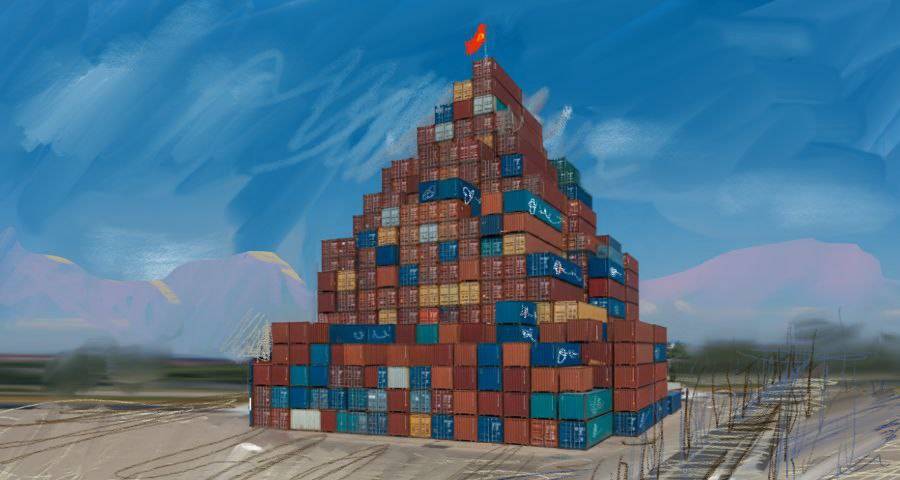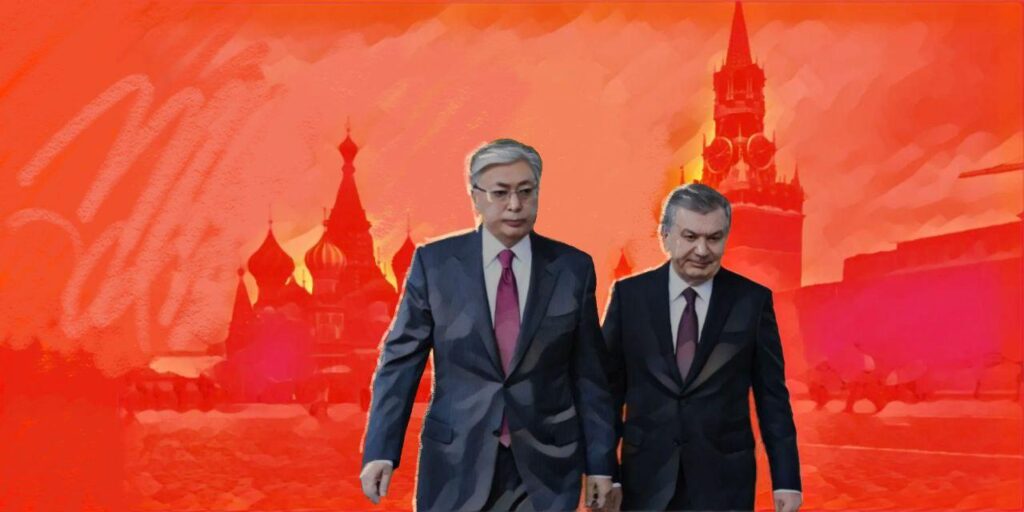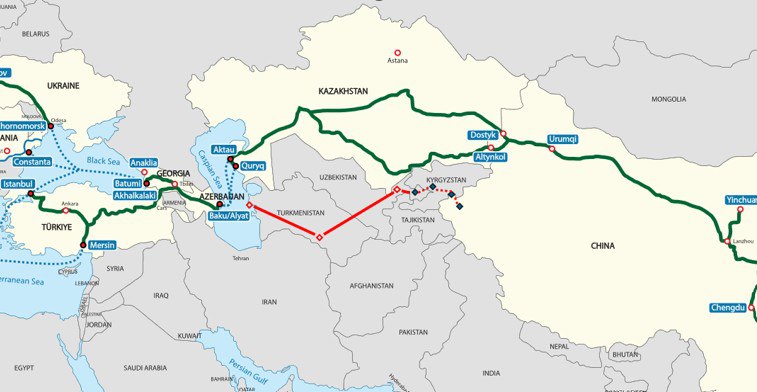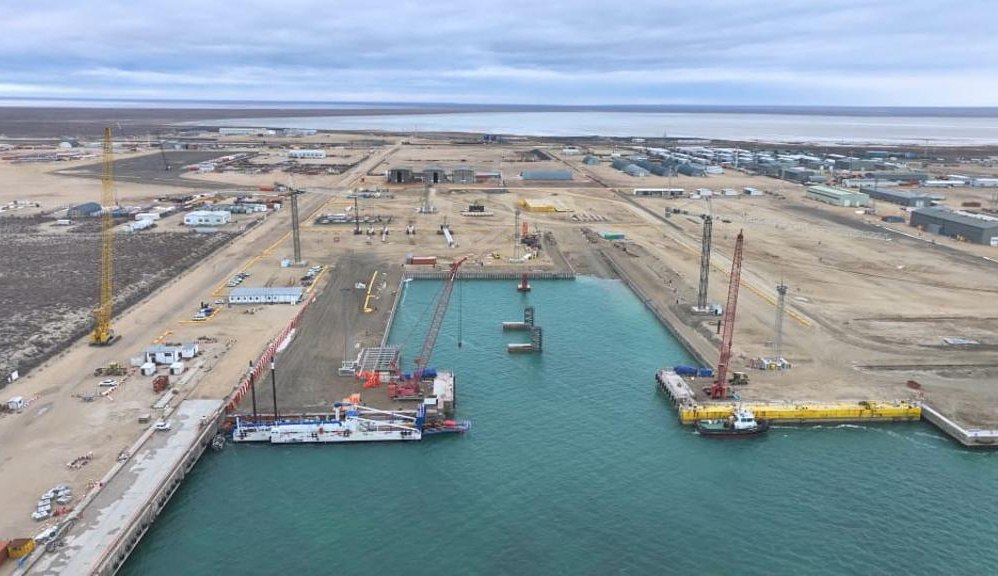It was announced during the 8th International Silk Road Expo in Xi’an in September 2024 that China will formally join the Middle Corridor under the guise of participation by the China Railway Container Transport Corporation (CRTC). This move signals a growing reliance on Central Asia’s trade-route infrastructure potential. China’s shift to overland routes is part of a broader strategy to diversify away from traditional maritime routes through chokepoints like the Strait of Malacca, which carry geopolitical risk.
Kazakhstan’s strategic geographic location naturally makes it indispensable to China’s trade, and infrastructure projects currently underway represent a key component of the Middle Corridor’s potential. In July 2024, Kazakh President Kassym-Jomart Tokayev ratified agreements with China aimed at further developing the Middle Corridor, enhancing both road and rail infrastructure.
The country has already been upgrading its rail infrastructure, modernizing dry ports like Khorgos on the Chinese border, and expanding transit facilities at the Caspian Sea port of Aktau. The increased flow of goods through Kazakhstan is evident: over 212 container block trains have passed through the country by September 2024, with the number projected to exceed 300 by the year’s end.
These build-outs, and particularly Kazakhstan’s modernization of its railways, go hand-in-hand with the recently finished improvements along the Baku-Tbilisi-Kars (BTK) line, which connects Azerbaijan to Turkey via Georgia. The expansion of the BTK line’s capacity from 1 million to 5 million tons per year has now been completed. As a result of all these efforts, the travel time for goods from China to the Black Sea has been reduced to just 10–12 days, highlighting the efficiency of the corridor.
Azerbaijan also plays a crucial role in this economic ecosystem. Baku’s port of Alat serves as a critical transit point for cargo crossing between Central Asia and the South Caucasus. Azerbaijan’s collaboration with Kazakhstan, Georgia, and Turkey has led to significant investments in expanding port facilities and upgrading railway systems beyond the crucial BTK link mentioned above. The result is a smoother, more reliable flow of goods from China to Europe. Azerbaijan is winning its bet to become a regional logistics hub.
In addition, a Chinese consortium recently secured the contract for the construction of the Anaklia deep-sea port in Georgia, a strategically important site on the eastern edge of the Black Sea. The project was initially awarded to a Georgian-American consortium, but was cancelled in 2020 due to political and legal disputes.
Following a new tender process this year, the Chinese consortium emerged as the sole bidder. If supporting infrastructure is adequately developed and the Black Sea’s cargo transit capacity can be significantly enhanced, then the Anaklia port could become a critical node in the Middle Corridor, enhancing its role in Eurasian trade and bolstering regional connectivity.
China’s increased reliance on Central Asian, trans-Caspian, and South Caucasus routes is not just about efficiency. It is also a strategic diversification to mitigate the risks posed by geopolitical instability in other regions. Traditional sea routes through maritime choke-points as well as overland routes like the Northern Corridor through Russia have become problematic, all for different reasons.
Due to global geoeconomic complications arising from Russia’s ongoing war against Ukraine, not only China but also Europe has expressed concerns about the reliability of the Northern Corridor. The Middle Corridor offers an alternative bypassing these risks while leveraging Central Asia’s increasingly sophisticated logistical integration.
In addition to economic and strategic benefits, the Middle Corridor offers what are viewed as environmental advantages. Overland routes, particularly those relying on rail, tend to be less carbon-intensive than long-distance maritime shipping, which is a major contributor to global carbon emissions.
China thus showcases its shift toward rail and multi-modal transport along the Middle Corridor as an element in its policies to align with global sustainability goals. This has provided it with opportunities for successful public diplomacy around UN-driven development goals. It also plays well in the European Union, where reduced carbon footprints in international trade are still a major policy point.
It seems likely that China may contribute to initiatives for the Middle Corridor’s integration and logistical efficiency in such technological domains as advanced tracking systems, real-time data sharing, and seamless customs procedures. Kazakhstan, Azerbaijan, and Georgia have been cooperating on digital platforms to facilitate smoother and more efficient border crossings; these reduce delays while ensuring the integrity of goods. Such advances also ensure Central Asian competitiveness as a transport link.
China’s integration into the Middle Corridor marks a qualitatively new stage in the country’s trade strategy, where Central Asia’s role becomes indispensable to it. It confirms the emergence of Kazakhstan and Azerbaijan as vital players in Eurasian logistics.
Countries along the route are poised to benefit from China’s investments and their own efforts to modernize infrastructure. For Central Asia, the Middle Corridor is more than just a transit route. It represents a gateway to greater economic integration and regional stability.









